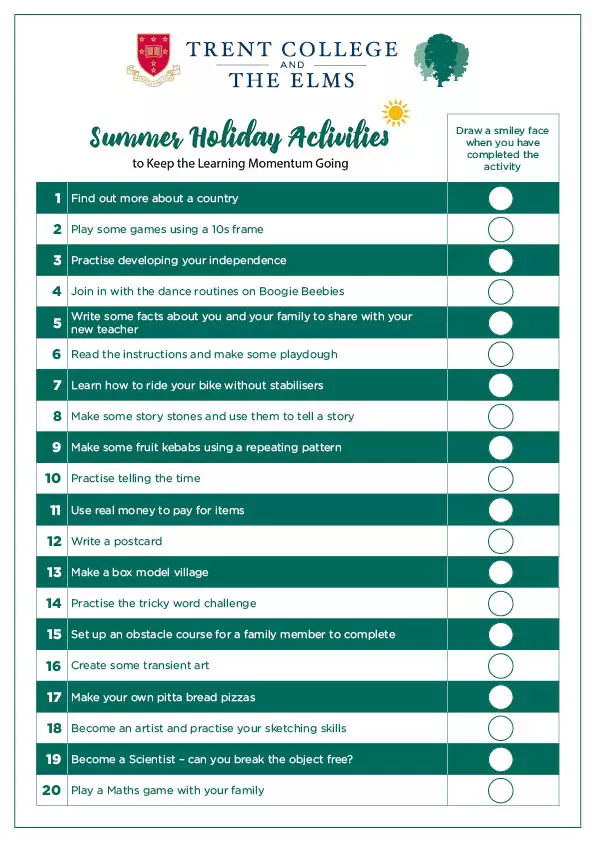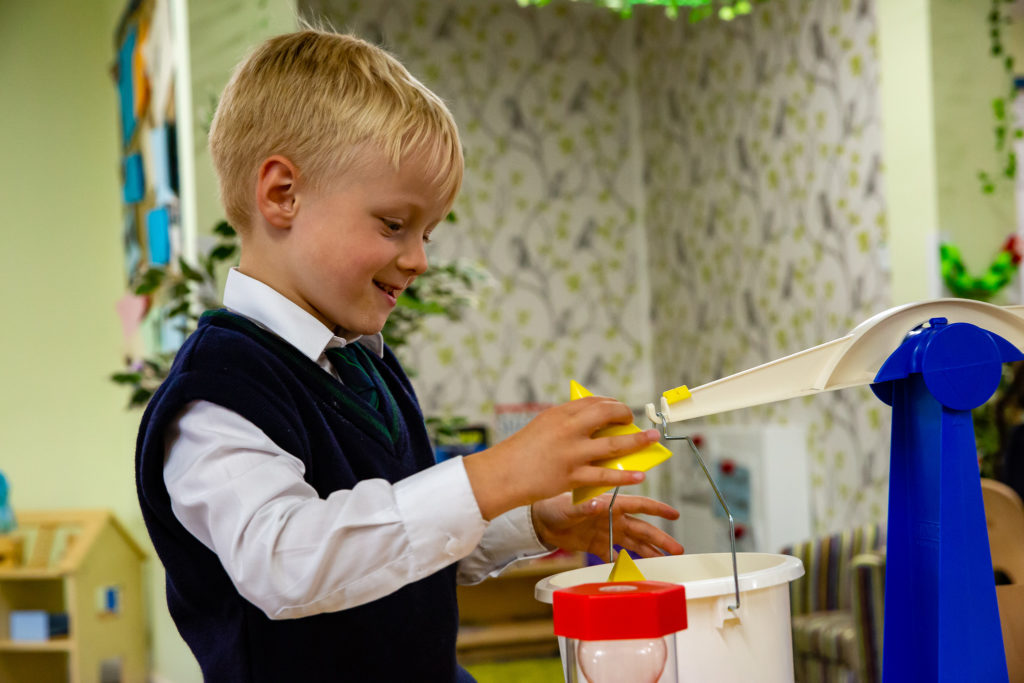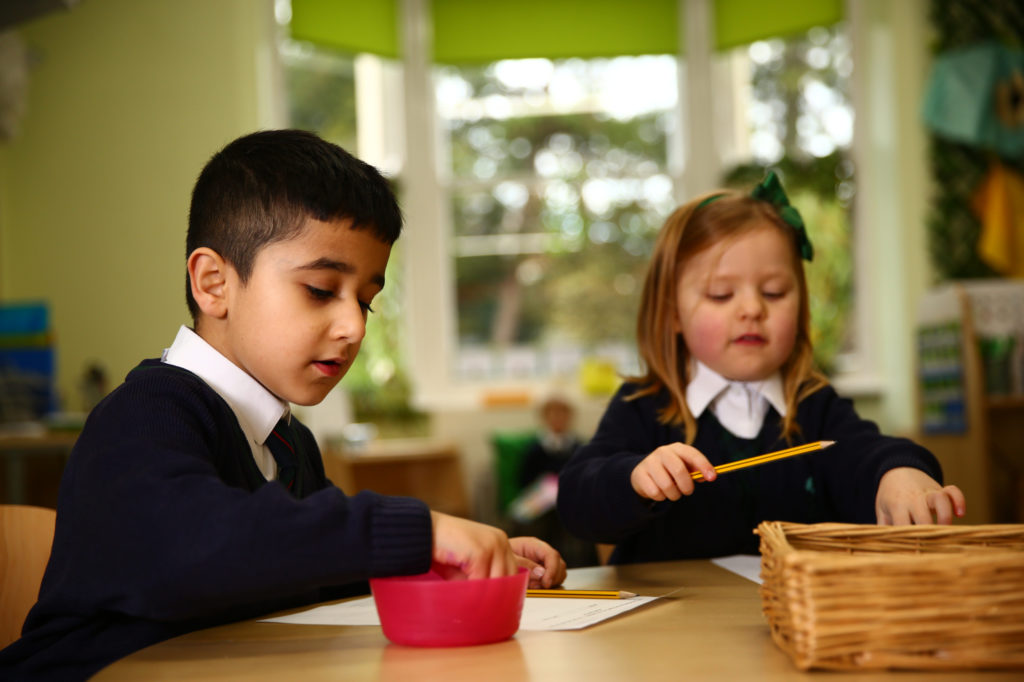Mrs Savage, Assistant Head (EYFS & Infants), shares some of her favourite activities that will entertain and educate young children over summer, leaving them feeling excited and prepared for the return to school in September.
This list was created to support the developmental needs of pupils in Pre-School, Reception and Infants (children aged 4 to 7), however many of these activities can be adapted to benefit primary school children of all ages.
-
Find out more about a country
Look at a world map and select a country you would like to find out more about. Here are a few ideas to get you started…
What is the country famous for?
What food do they eat there?
Maybe you could try and create the national dish?
Could you write a weather report?
Can you make a flag?
What animals would you find there?
What language do they speak?
Is there a traditional dance?
-
Play games using a 10s frame
Create a 10s frame using lollipop sticks or masking tape on the floor. Your 10s frame will need 10 equal spaces, 5 on the top and 5 on the bottom. 10s frames help develop your child’s number sense (having good intuition about numbers and their relationships). There are lots of ideas for how to use a 10s frame on the internet, here’s one game to get you started.
Resources: 2 x 10s frame per player, counters (something linked to your child’s interests- e.g. dinosaurs, buttons), dice
Each player takes a turn to roll a die, read the numeral and place that amount of counters on their 10s frame. The winner is the first player to fill all twenty spaces.
Can your child tell you how many more counters they need to reach twenty?
-
Practise developing independence
Set your child the challenge of getting dressed all by themselves (break this task into steps if needed).
Try racing against a timer.
Can your child estimate how long it will take them?
Did it take a longer or a shorter amount of time than they thought?
-
Join in with the dance routines on Boogie Beebies
‘Go Go Mango’ and ‘Teatime’ are very popular choices in the Savage household. More information can be viewed on the BBC website.
-
Write some facts about you and your family to share with your new teacher
Remind your child to use ‘Fred Talk,’ capital letters and finger spaces. Can they read their writing back to check it makes sense?
-
Reading instructions and making play dough
Write out a set of instructions for your child to read so that they can make their own play dough. This website has some great easy to follow play dough recipes. Encourage your child to experiment:
adding different colours
adding scents, try fresh herbs
-
Learn how to ride your bike without stabilisers
The summer holidays are the perfect time to master a new skill. How about removing your child’s stabilisers and seeing if they can master riding their bike? Remind your child that they will need to persevere and with a little bit of practise each day they will be heading towards a new sense of freedom!
Motivating ideas:
Attaching a bell
handlebar streamers
a basket for their favourite toy
-
Make story stones and use them to tell a story
Go on a walk to collect a variety of stones of varying sizes
Help your child to decorate the stones with various characters, animals or objects from a book (permanent markers work best for this)
Use the stones to help re-tell a familiar story by ordering the stones
-
Make fruit kebabs using a repeating pattern
Encourage your child to prepare the fruit by washing it and cutting it up (I would highly recommend purchasing a safety knife. It’s the perfect way to introduce your child to using knives in the kitchen without fear of any accidents!)
Can your child create a repeating pattern with their fruit before then threading it onto the skewer?
-
Practise telling the time
Refer to clocks around the house when events happen in the day to introduce what that time looks like (start with analogue first).
What time is lunchtime?
Dinnertime?
Bath time?
Bedtime?
Having a clock or wrist watch for your child to practise on is a great way to help them really understand the concept, these can be shop bought or homemade. Explain that the short hand is the hour hand and the long hand is the minute hand. Start with o’clock and then move onto half past.
-
Use real money to pay for items
Set up a shop using food from the cupboards
Encourage your child to write price tags for the food items and then use real money to buy things
Can your child work out the total and how much change is needed?
Show your child how to write a receipt.
-
Write a postcard
When you are on holiday, challenge your child to write a postcard to their new teacher and pop it in the post. Don’t forget your ‘Fred Talk,’ capital letters and finger spaces. Can your child read their writing to check it makes sense?
-
Make a box model village
Demonstrate how to draw a plan for your model village.
Talk about the 3D shapes that they will need.
Show your child how to fold the card to create an opening door.
Encourage your child to come back to their creation on another day to add more detail.
-
Practise the tricky word challenge
Introduce the tricky word challenge (your child may know these as the ‘red words’). They are referred to as tricky as your child will be unable to read them using their current phonic knowledge. For your child to succeed in reading, it is essential that they have a bank of tricky words that they are able to read confidently. Challenge your child to see how many words they can read in a minute. See if they can beat the record each day. A google search will bring up a list of Read, Write, Inc red words.
Top tip: Keep the box of tricky words and a timer on the kitchen table so that you can have a sneaky practise before breakfast or dinnertime. Repetition is key when it comes to the tricky words.
-
Set up an obstacle course for a family member to complete
Ask your child to demonstrate what you need to do to complete the obstacle course.
Encourage your child to create a start and finish flag.
Estimate how long it will take to complete the course.
Set your timer to check and then decide if your child made a good estimate.
How could you make the obstacle course more challenging?
Talk about the effects of exercise on your body.
-
Create some transient art
If this is a concept that is new to you, it’s essentially art that’s movable and there’s no need for glue.
Encourage your child to collect some items from indoors or outdoors to create a picture or pattern.
Create a frame by using sticks or ribbon.
Take a photo of their finished artwork, print it out, and stick it onto some card.
Write a message inside and pop it in the post to brighten someone’s day.
-
Make your own pitta bread pizzas
Help your child to write a list of ingredients that they will need.
Demonstrate how to prepare the toppings, e.g. how to wash and cut up the peppers.
Talk about making healthy choices.
When children are involved in meal preparation, you will often find they will eat more and may even sample some new foods.
-
Become an artist and practise your sketching skills
Tune into your child’s interests to select a character or object that they would like to draw.
Demonstrate how to sketch the outline of an object, talk about the shapes, lines and detail.
YouTube has an excellent range of videos for step by step drawing guidance.
-
Become a Scientist – can you break the object free?
Half fill a Tupperware box with water.
Find an object that you would like to freeze (e.g. flowers, zoo animals, Lego people) and pop it in the water.
Place the box in the freezer overnight.
Pose the question: how could we rescue the…. elephant/flowers/Lego person…
Allow your child to experiment with adding sugar and salt to see what effects they have on the ice.
-
Play a Maths game with your family
A whole host of maths skills can be covered whilst playing games. Read my recent blog on maths games in the early years and choose a game to play with your family.
–
Print out the checklist below by clicking here and see how many of our 20 activities you and your child can successfully complete before September!

We operate an all year round Admissions process but now have only limited places in our Pre-School, Reception and Junior classes available for September 2021. Find out more about Nursery & Pre-School, Reception and the rest of the Juniors.

